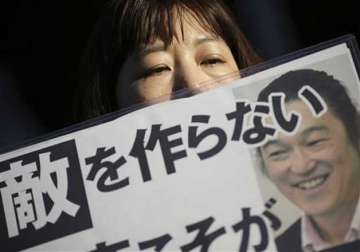Japan mourns Kenji Goto as caring and courageous reporter
Tokyo: Whether in tsunami-stricken northeastern Japan or conflict-ridden Sierra Leone, the stories of the vulnerable, the children and the poor drove the work of journalist Kenji Goto.The news of his purported killing by Islamic State

Tokyo: Whether in tsunami-stricken northeastern Japan or conflict-ridden Sierra Leone, the stories of the vulnerable, the children and the poor drove the work of journalist Kenji Goto.
The news of his purported killing by Islamic State militants sent Japan into shock and mourning early Sunday morning, days after his plight as a hostage in Syria united many people in praying for his release.
“I want to cuddle with the people. That's the best way to express my approach,” Goto, 47, said about his work. “By cuddling with them, I can talk with the people. I can hear their views—their pain and their hopes.”
A pony-tailed man with a friendly, carefree laugh, Goto was a veteran freelance reporter, working often with other filmmakers and Japanese TV producers. His comments were sometimes featured on Japanese mainstream media.
The 2005 book he wrote about the suffering of children in Sierra Leone was titled “We Want Peace, Not Diamonds.”
But Goto had always stressed he was not a war reporter. He had insisted he was instead devoted to telling the story of regular people, one step removed from the war zone.
That took him to refugee camps and orphanages. He told the stories of children suffering violence, hunger and nightmares.
In a testament to his charm and integrity, people responded with an outpouring of support to try to win his release.
A Facebook page, set up immediately after the first video released by militants last month, quickly drew tens of thousands of “Likes” and photo postings that showed people, from not just Japan but around the world, holding up hand-written signs that said: “I am Kenji.”
“Kenji lives on—in all our hearts. In our daily work. Every time you smile with those around you, you will be sure to remember that big smile Kenji always gave us,” wrote Taku Nishimae, a filmmaker living in New York and the page's creator.
An online petition demanding the government do more to save Goto collected thousands of signatures. Crowds have gathered outside the prime minister's office, holding up “Free Kenji” and “I am Kenji” signs.
Those who knew Goto said he was a gentle and honest man. On the streets of Tokyo on Sunday, many people were clutching the Yomiuri newspaper extra with the latest news, expressing disbelief that his captors went as far as to kill a reporter. U.S. reporter James Foley and American-Israeli journalist Steven Sotloff were among several Westerns who had been killed by the militants last year.
“Kenji has left us on a journey,” said Junko Ishido, 78, Goto's mother. “It is my only hope that we can carry on with Kenji's mission to save the children from war and poverty.”
Goto had been captured at least once before by militants in the Middle East, but had convinced them to let him go by showing that he was a reporter.
According to Goto's wife Rinko Jogo and others who had spoken with him, Goto had gone to Syria late last year to try to save the other Japanese hostage, Haruna Yukawa, 42. Yukawa was shown as killed in an earlier video purportedly released by the militants.
Yukawa's father, Shoichi Yukawa, could not hold back his tears at the news of Goto's killing.
“He was kind. And he was brave,” he told reporters.
Goto went to Syria just three months after his second daughter was born. Before his last trip, he made a video recording.
“No matter what happens to me, I will always love the people of Syria,” he said calmly, looking straight into the camera.
